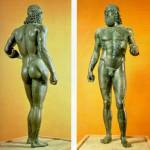Earlier this week I gave a talk in Indianapolis at the excellent Liberty Fund on whether free-market capitalism is good or bad for art.
The question matters in today’s intellectual context because thinkers on both left and right argue regularly that art suffers under free market systems. Traditional conservatives such as Robert Bork and neo-conservatives such as Irving Kristol believe that capitalism’s freedom allows and encourages us to indulge our basest impulses, which means irrational and immoral work comes to dominate the art world. Meanwhile leftish thinkers such as Benjamin Barber and Richard Brustein believe that capitalism’s mass market means that middlebrow taste is where the money is, which seduces true artists to sell out for the lowest common denominator.
mass market means that middlebrow taste is where the money is, which seduces true artists to sell out for the lowest common denominator.
My view is that both left and right are badly wrong on this issue. The talk I gave at Liberty Fund comes out of my current documentary and book project with the working title The Fate of Art under Capitalism. In the talk I focused mostly on one strand of my overall argument — the historical thesis that the outstanding eras in art history have all arisen in cultures that had relatively free markets and democratic or republican politics. Classical Athens, Renaissance Florence, the Dutch Golden Age, and nineteenth-century Paris all fit this pattern.
The question-and-answer session after my talk was a lively discussion of a wide variety of examples of cultures — ancient Egypt, Naples in the Renaissance, Elizabethan England, China — and whether their art achievements supported or contradicted my thesis. Great fun, for which I thank the participants. Thanks also to philosopher Douglas Den Uyl for the invitation.
 Liberty Fund, in case you are not familiar with it, is an organization that sponsors a wide variety of conferences for academics. It also hosts the Concise Encyclopedia of Economics, a widely-used resource, especially for students, in economics, business, political science, and public policy; Econlog, the web log of three very smart and clear-writing economists, Bryan Caplan, David Henderson, and Arnold Kling; and Russ Roberts’s EconTalk, an ongoing series of podcasts devoted to interviews with a wide range of economists on timely subjects. Liberty Fund’s site also hosts an astounding free online collection of books and essays from the history of economics, history, political theory, and philosophy. Over the past few years I’ve used many of them in my courses.
Liberty Fund, in case you are not familiar with it, is an organization that sponsors a wide variety of conferences for academics. It also hosts the Concise Encyclopedia of Economics, a widely-used resource, especially for students, in economics, business, political science, and public policy; Econlog, the web log of three very smart and clear-writing economists, Bryan Caplan, David Henderson, and Arnold Kling; and Russ Roberts’s EconTalk, an ongoing series of podcasts devoted to interviews with a wide range of economists on timely subjects. Liberty Fund’s site also hosts an astounding free online collection of books and essays from the history of economics, history, political theory, and philosophy. Over the past few years I’ve used many of them in my courses.
[Images: The statue is the Riace Warrior (c. 450 BCE). The symbol, which Liberty Fund uses as its logo, is the ancient Sumerian cuneiform “amagi,” which is thought to be first written reference to the concept of liberty.]